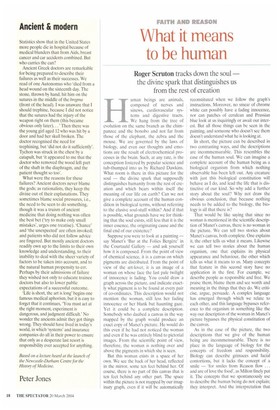Ancient & modern
Statistics show that in the United States more people die in hospital because of medical blunders than from Aids, breast cancer and car accidents combined. But who carries the can?
Ancient Greek doctors are remarkable for being prepared to describe their failures as well as their successes. We read of one Autonomus who 'died from a head wound on the sixteenth day. The stone, thrown by hand, hit him on the sutures in the middle of the bregma (front of the head). I was unaware that I should trephine, because I did not notice that the sutures had the injury of the weapon right on them (this became obvious only later)... ' Then there was the young girl aged 12 who was hit by a door and had her skull broken. The doctor recognised the need for trephining, but 'did not do it sufficiently'. Tychon was struck in the chest by a catapult. but 'it appeared to me that the doctor who removed the wood left part of the shaft in the diaphragm, and the patient thought so too'.
What were the reasons for these failures? Ancient doctors never blame the gods; as rationalists, they keep the divine out of their explanations. They sometimes blame social pressures, i.e., the need to be seen to do something, though it was a truism of ancient medicine that doing nothing was often the best bet ('try to make only small mistakes', urges one treatise). 'Chance' and 'the unexpected' are often invoked; and patients who did not follow advice are fingered. But mostly ancient doctors readily own up to the limits to their own knowledge and understanding, to their inability to deal with the sheer variety of factors to be taken into account, and to the natural human propensity to err. Perhaps by their admissions of failure they wished not only to educate trainee doctors but also to lower public expectations of a successful outcome.
'Life is short, the art is long' begins one famous medical aphorism, but it is easy to forget that it continues, 'You must act at the right moment, experiment is dangerous, and judgment difficult.' No wonder the ancients admit they got things wrong. They should have lived in today's world, in which 'systems' and insurance companies do all in their power to ensure that only as a desperate last resort is responsibility ever accepted for anything.
Based on a lecture heard at the launch of the Newcastle-Durham Centre for the History of Medicine.
Peter Jones


















































































 Previous page
Previous page